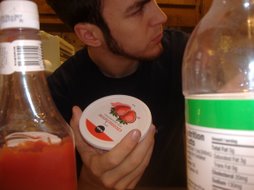We got to discuss how, in Jesus, there is a New Exodus. The Hebrew people got much of their identity from the old exodus. This included an innocent lamb's blood, freedom from bondage, passing through waters, receiving the Law, and being led by God's presence. In this New Exodus [Rom 5-8], all its blessings flow from the slain and risen Lamb. We are unfettered from sin, death, and Satan. We pass through the waters of baptism. We must now live by the Law of God written on the heart. This is done by knowing we can't on our own, but knowing we can by the presence of God guiding us. He guides because He indwells. He is the New Covenant, New Exodus, Holy Spirit of God [Jer 31, Ezk 36-37].
We were able to talk about how Peter's sermon in Acts 2 shows that the Spirit's presence means we are now living in the last days. So, the Spirit's presence looks back to the exodus and is also the down payment of future glory that has entered into our hearts in the present [Eph 1, Eph 4].
Obviously, some of the most fun talks we got to have were over the gifts of the Spirit. Deconstructing the absurd arguments of cessationists in 1 Cor 13.8-10 was healthy for them to witness. Paul's three pleas to the Corinthians to "earnestly desire" the gifts are huge [12.31, 14.1, 14.39]. Nobody prays like that: "Spirit, grant us to speak in the tongues of angels. Cause us to prophesy." It sure sounds biblical though if you read 1 Cor 12-14. This is particularly convicting if you read 12.1. "About spiritual gifts, brothers, I do not want you to be ignorant."
When we pondered the deity of the Spirit, we logically turned to St Paul. One of the primary things that I wanted them to see was that Paul rarely sought to prove that the Spirit was fully divine. This fact seems assumed to him. Rather, Paul seeks to show that the Spirit's divinity means something. The fullness of God - dwelling in sinners! Paul is floored by this and longs for the experiences of life that will come from it. This is how Paul talks about the Spirit's deity.
So... I had to give him half credit.
Question 7 on their test read, "What did we say in class about how the Apostle Paul writes about the deity of the Spirit?" His thoughtful answer:
He writes with a feather, lightly dipped into the ink, and carefully strokes the papyrus.




No comments:
Post a Comment